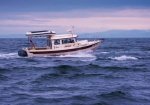Although
examination of the Conception’s electrical system was not possible, the examination of the Vision
and the similarity of the two vessels would suggest similar electrical installations and condition.
On October 2, 2019, a Coast Guard inspection found 19 electrical system deficiencies throughout
the Vision. Some of the deficiencies cited were a result of work being done at the time. Deficiencies
in the salon and galley area included corrosion, improper connectors, and signs of overload on a
power strip. Deficiencies of this type can lead to electrical system malfunctions capable of
initiating a fire.
Since the salon compartment was a critical element in the egress pathway from the
passenger bunkroom, prudent fire safety planning would suggest that risky activities (unattended
charging of batteries) and materials, such as the plastic chairs and polyethylene trash cans, that
could contribute to a fire should have been minimized in this area. This was not the case on the
Conception. Crew statements, as well as statements from previous passengers, indicated that the
overnight, unattended charging of a large number of batteries was a normal practice in the salon
compartment and was a risk that had not been considered. Each device and battery represented a
separate potential source of ignition. The passengers on the Conception were recreational divers,
so in addition to common types of electronic items, such as phones, tablets, digital cameras, and
laptops, divers also used underwater cameras, flashes, strobes, and flashlights.
Batteries (in particular, lithium-ion batteries) have a known and documented history of
initiating accidental fires. In the past, the Consumer Product Safety Commission has issued
numerous product safety recalls due to fires caused by electronic devices with defective batteries
and chargers. The NTSB has investigated accidents in which battery failures led to fires, and, based
on the history of incidents involving fires, the Federal Aviation Administration enforces
regulations on the carriage of lithium-ion batteries aboard passenger aircraft.
36 About a year prior
to the fire on board the Conception, a small fire involving a charging lithium-ion battery took place
on board the similar vessel Vision; a passenger was able to extinguish the fire by unplugging the
charger and throwing it in a rinse bin. However, unlike in the incident on board the Vision, the fire
aboard the Conception grew, and the vessel burned for almost four hours, thus destroying much of
the materials in the salon and aft deck area. Further, based on past accidents that the NTSB has
investigated, conclusive causal physical evidence identifying a thermal runaway of a lithium-ion
36 Recent NTSB investigations involving battery fires include Lithium-Ion Battery Truck Fire Following Aerial
Transport, Brampton, Ontario, Canada, June 3, 2016 (HZB-20/01) and Auxiliary Power Unit Battery Fire Japan
Airlines Boeing 787-8, JA829J, Boston, Massachusetts, January 7, 2013 (AIR-14/01). These reports and other
information regarding investigations involving battery fires are available at
www.ntsb.gov.
NTSB Marine Accident Report
61
battery is difficult to differentiate from a lithium-ion battery thermal runaway caused by exposure
to fire.
At the exterior of the aft portion of the salon (in the area where the stairs lead to the upper
deck), the only potential sources of ignition would include transient types, such as discarded
smoking materials. Based on the examination of the Vision and the statements from previous
passengers, there was no evidence of electrical systems or electronic devices being charged in this
area. There was, however, one large polyethylene trash can located aft of the salon underneath the
stairs to the upper deck where one could potentially discard smoking materials. Old T regulations
did not allow for the use of these trash cans in the passenger bunkroom but did not preclude their
use in any other area of the vessel. New T regulations do not allow the use of these combustible
trash cans in any areas of the vessel but do not retroactively apply to vessels built under the Old T
regulations unless they are replaced. As stated earlier, polyethylene trash cans are highly
combustible, making them susceptible to accidental fires that could be caused by the improper
disposal of smoking materials or other unforeseen sources of ignition. The NTSB concludes that
although a definitive ignition source cannot be determined, the most likely ignition sources include
the electrical distribution system of the vessel, unattended batteries being charged, improperly
discarded smoking materials, or another undetermined ignition source.

